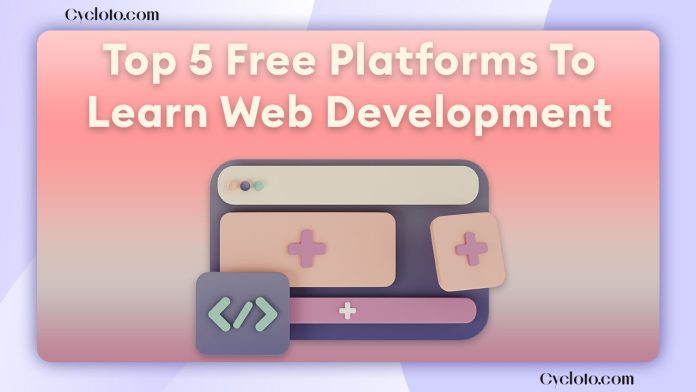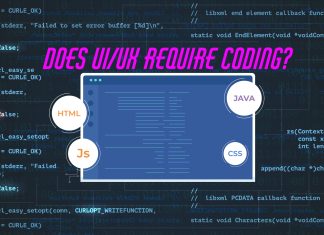To become a great web developer, it’s important to follow good guidelines and work on the right projects. Learning the basics well, like HTML, CSS, and JavaScript, is very important. Without a strong foundation in these, navigating real-life projects or jobs might pose challenges. However, many folks here often struggle with indecision, unsure of where to begin or which course to join, especially if you’re a beginner. Fear not! There’s a treasure trove of learning platforms offering free access to these essential skills. Embracing these resources is key to starting your journey to Learn web development effectively.
In this blog, we’ll explore five fantastic platforms where you can learn web development basics without spending a dime. From interactive coding lessons to comprehensive tutorials and engaging projects, these resources cater to beginners and seasoned learners alike. You can easily take yourself from beginner to advanced developer if you complete the content of these platforms. So, let’s explore these incredible free platforms and master HTML, CSS, and JavaScript on your way to becoming a top-notch web developer!
Mozilla Developer Network

Mozilla Developer Network (MDN) stands as a reputable and widely used platform for learning web development, renowned for its in-depth, up-to-date documentation. With contributions from global developers and experts, it offers diverse perspectives and valuable content, including tutorials, guides, references, interactive examples, and complete learning paths, guiding users from beginner to intermediate and beyond.
Pros:
The MDN team actively maintains and updates the content, ensuring the learning of the latest technologies and practices. All content is free, making it an accessible resource for everyone. MDN offers both documentation and tutorials for learning web development. Which is really great because most platforms offer either video lessons or practical exercises in their browser. Also, their extensive documentation is well-written, facilitating easy understanding. MDN prioritizes standard practices and cross-browser compatibility, providing a solid foundation for creating versatile websites.
Cons:
The detailed information might feel overwhelming initially, especially for beginners. Also, MDN’s learning experience is less interactive and gamified compared to platforms like Freecodecamp or Codecademy.
Coursera

Coursera is another popular place to learn online. It offers a wide range of courses, special classes, and even degrees in various subjects like web development, taught by universities and industry experts. Their courses have clear objectives, video lessons, quizzes, and projects to complete. When you complete it, you receive a certificate that can add value to your resume and showcase your skills.
Pros:
One of Coursera’s strengths is its flexibility, allowing you to learn at your own pace. Moreover, its structured programs and strong community support offer an excellent foundation to kickstart your web development journey on Coursera
Cons:
While some courses are free, certifications and specializations often require payment. This could be costly for those on a tight budget. Additionally, while Coursera’s courses are typically developed by top universities and industry experts, ensuring high-quality content, the varying institutions creating these courses can result in differences in the quality of instruction.
Khan Academy

Khan Academy is a popular online learning platform that offers a wide range of courses across various subjects, including web development. If you’re new and scratching your head about where to start, Khan Academy’s got your back. They’ve got structured courses in HTML, CSS, and JavaScript – the essentials for web development. Additionally, you can find interactive elements like coding challenges and quizzes, which can enhance your learning experience.
Pros:
Their beginner-friendly approach makes it ideal for those who are new to programming or web development. Also, most of the content on Khan Academy is free, making it accessible to anyone with an internet connection. They focus on theory, nailing down the fundamentals, and prepping you well for job interviews.
Cons:
While this is great for beginners, if you want to learn web development more in-depth or advanced topics, you may need to explore other platforms or resources. Compared to some other platforms, Khan Academy offers less personalized feedback and support.
Codecademy

If you are a beginner or have some prior coding experience, then Codecademy can be a good start because its interactive lessons and gamified approach make learning engaging and accessible, even with no prior coding experience. Codecademy offers structured paths covering essential web development languages like HTML, CSS, and JavaScript, often with branching options for more specific interests.
We’d also like to highlight the differing approaches to learning between Codecademy and Khan Academy. Khan Academy utilizes videos and interactive exercises, focusing on theoretical explanations of concepts. On the other hand, Codecademy emphasizes hands-on coding within their browser-based environment, offering immediate practice opportunities.
Pros:
Most lessons involve writing real code through its in-browser editor, giving immediate feedback and a sense of accomplishment. It hosts a large and active community forum where learners can ask questions and get help from other learners and instructors.
Cons:
While Codecademy provides a solid foundation, some users find that it focuses more on practical exercises rather than emphasizing theoretical concepts, which could be important for a deeper understanding, especially in job interviews. Additionally, the platform offers free courses but also has a Pro version with more content. The subscription cost might be a downside for some learners.
FreeCodeCamp

As the name suggests, FreeCodeCamp gives free access to all study materials and projects, making it affordable for everyone. It covers fundamental web development concepts like HTML, CSS to advanced topics like JavaScript, front-end frameworks, and back-end technologies. FreeCodeCamp primarily offers a hands-on coding experience through its interactive coding challenges and projects on its website.
Pros:
It has a supportive community and mentors to help you along the way. You can earn certifications by completing different sections of the curriculum. FreeCodeCamp’s certificates are well-regarded in job listings.
Cons:
Beginners might find project-based learning tough without much guidance. While learning at your own pace is good, some may struggle with motivation and stop halfway. They aim to help people learn web development effectively using text tutorials and interactive challenges. But without video tutorials, some may find it harder to learn.
Learn Web Development from YouTube
You can also follow YouTube channels like The Net Ninja, and Traversy Media which have been making videos on web development for a long time. By following these 2 channels you can easily learn about Frontend and backend Development as well as other technologies like Git, SASS, Gulp, Webpack, etc.
To become a web developer, remember: hard work, patience, and consistency are key. You can definitely learn web development from the platforms mentioned earlier without spending money. Pick one platform, start your journey without hesitation, and once you feel confident, you can explore two platforms simultaneously.
Read more: What are the skills required for Full Stack Developer?



